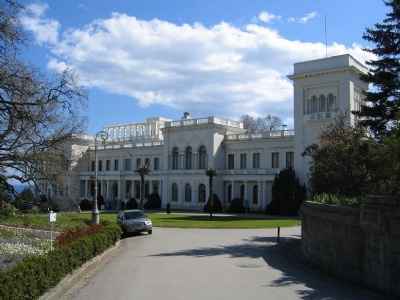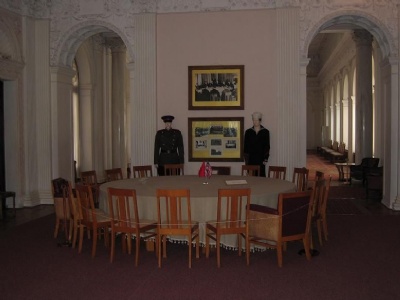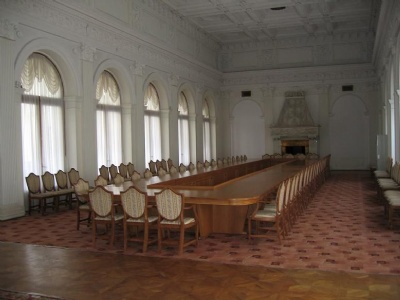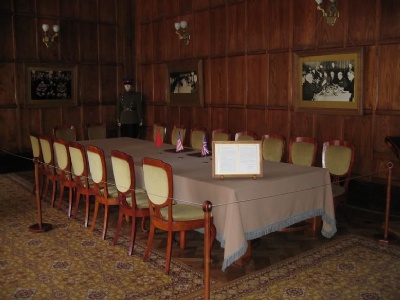Livadia Palace
Livadia Palace was built at different stages between 1860 and 1911. The palace was used by the last Russian tsar, Nikolai II, and his family during holidays in Crimea. The palace was also a meeting place for the Yalta conference in February 1945 between President Franklin D. Roosevelt, British prime minister, Winston Churchill and Soviet secretary general, (dictator) Joseph Stalin. Yalta conference was the second out of three major meetings between the "big three". The first meeting took place in Teheran in 1943 and the third in Potsdam outside Berlin in July/August 1945. The reason the conference was held in Crimea was because Stalin refused to travel outside Soviet Union.
Each leader had an agenda for the meeting. Roosevelt tried to persuade Stalin to declare war on Japan and participate in a possible invasion of the Japanese mainland. Churchill was strongly anti-communist and he saw a threat to the interests of the weakened British empire, particularly in south-eastern Europe. Churchill called for free elections to be held after the war in states liberated by Soviet Union. Stalin declared that he felt obliged to build a security zone in Eastern Europe in order to prevent Soviet Union from being attacked again in the furure.
Stalin explained that Poland was of particular importance for the security of Soviet Union. He did not intend to risk Poland being used once again as a marching area for an invasion of Soviet Union (Russia) as Napoleon and Hitler did. Poland was therefore not up for debate. Stalin demanded certain areas of eastern Poland as a security zone. In compensation, Poland’s western border would be moved westward, which meant that millions of Germans had to be moved along. In return for these border changes, Stalin promised that there would be free elections in Poland. But elections later held were rigged and secured Stalin’s control over Poland. In order for Soviet Union to declare war on Japan, Stalin demanded that United States recognize Mongolia as an independent state. The United States did so without consulting China.
In August 1945, the Soviets officially declared war on Japan and captured some Japanese island groups nirth of Japan. The historical verdict has been that Roosevelt and Churchill were too complaisant regarding Stalin’s demands on Eastern Europe. It is believed that they did not get anything in return. Both Churchill and Roosevelt had hopes of appeasing Stalin through the United Nations once Germany and Japan were defeated. All three had agreed that the League of Nations would be replaced by a more effective world organization, strong enough to intervene in intergovernmental conflicts. The organization was named the United Nations.
Current status: Preserved with museum (2007).
Location: 44°28'04.32" N 34°08'36.58" E
Get there: Bus.
Follow up in books: Harbutt, Fraser J: Yalta 1945 (2010).




The museum opened in the early seventies when there was a detente between United States and Soviet Union. The museum wanted to show that Soviet Union and USA once had been allies, or on friendly terms at least.